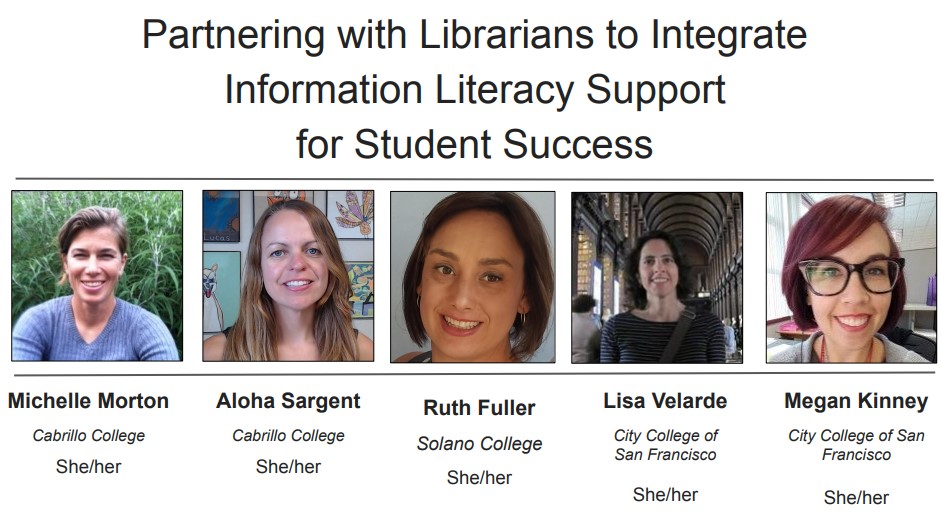Librarians Strengthen Student Success
By Ruth Fuller, Solano College, Megan Kinney, City College of San Francisco, Michelle Morton, Cabrillo College, Aloha Sargent, Cabrillo College and Lisa Velarde, City College of San Francisco
Five librarians in the California Community College system presented “Partnering with Librarians to Integrate Information Literacy Support for Student Success” at the Strengthening Student Success Conference in October 2019, generously sponsored in part by CCL. The conference was hosted by the RP Group, a non-profit engaged in research, planning, and professional development for California Community Colleges, and in particular, the data and evidence components of this work. The non-profit is active in many current initiatives of the CCCs, including guided pathways, AB 705, workforce-related activities, and more. SSSC is attended by faculty, administrators, deans, researchers, counselors, etc, and we thought this would be a good place to grow awareness among stakeholders about opportunities to partner with their own college libraries.

We then presented our integrations with English courses at our colleges. Cabrillo & Solano demonstrated their co-requisite library courses. Their transfer level English courses are paired with a 1 unit, online library research class, and these students utilize the activities in the library class to improve research in their English class. In addition, the classes explore timely topics, such as algorithmic bias and fake news. In some cases, the courses are embedded within retention programs, such as Puente and Umoja, and are integral to AB 705 adjustments and guided pathways projects.
City College of San Francisco presented a slightly different embedded model. In the Spring 2019 semester, five CCSF librarians were hired for an additional 20 hours of work to embed with English classes. With the compression of previous levels of English courses due to AB 705, most “students [are] placed into one of two versions of transfer-level English, either English 1A without support, or English 1A with support.”2 Librarians were embedded in the “with support” courses, and the pilot was paid for with Equity funds. The librarians used the time to collaborate with English instructors, create learning objects (such a research guides), and meet with the class a minimum of three times.
With each embed model, students were generally positive about the library component, with comments like “This class is very helpful for my future!” and noting how it helped them in other courses. The librarians reported an 8% increase in course success among students in the English 1A classes with an embedded librarian. In addition, the collaborative aspect was noted by English instructors, who no doubt feel overwhelmed by the rapid changes induced by AB 705.
Attendees were given time to reflect on current information literacy configurations at their campuses, and were then encouraged to share with others at their table. Attendees at the session asked questions about how we were funded, and how they could find the time to add deeper integrations with the library. Attendees identified as counselors, English instructors, administrators, and institutional researchers. We attempted to share how our models came to be, and how leveraging the library component can sometimes shift some of the burden away from faculty challenged with scaling these complex concepts in a short period of time.
Ultimately, we demonstrated that librarians are experts in information competency, and that libraries are key partners in many of the initiatives we are working to implement across the state. The session led to some thoughtful conversations, and we are optimistic that it inspired attendees to reach out to their librarians to collaborate. We hope to continue to spread the word at other community college-focused conferences. We encourage you to do the same! Library conferences are wonderful and generous spaces to find allies and share skills, but it is just as important to share our hard work in non-library spaces. What feels like part of the routine to you might be the missing piece needed to improve the success of students at another college. With 114 CA community colleges, there’s a lot of ground to cover!
References
1. Howe, Elaine M. "School Library Services." California State Auditor. Last modified November 17, 2016. https://www.auditor.ca.gov/pdfs/factsheets/2016-112.pdf. ↩
2. "The English Sequence." City College of San Francisco. Last modified December 14, 2018. https://www.ccsf.edu/en/educational-programs/school-and-departments/school-of-english-foreign-languages/english/EnglishSequence.html.↩